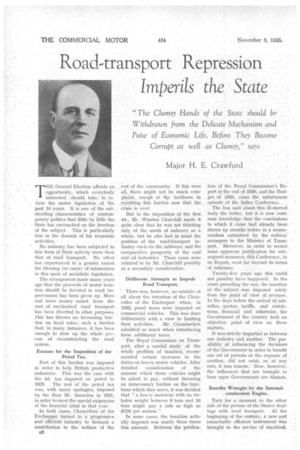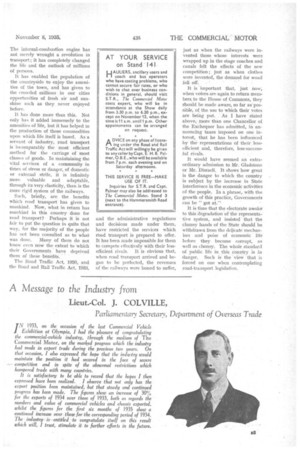Road-transport Repression Imperils the State
Page 124

Page 125

If you've noticed an error in this article please click here to report it so we can fix it.
"The Clumsy Hands of the State should be Withdrawn from the Delicate Mechanism and Poise of Economic Life, Before They Become Corrupt as well as Clumsy," says Major H. E. Crawfurd
THE General Election affords in opportunity, • which everybody interested should take, to review the motor legislation of the past 10 years. It is one of the outstanding characteristics of contemporary politics that little by little the State has encroached on the freedom of the subject. This is particularly true in the domain of his economic activities.
No industry has been subjected to this form of State activity more than that of road transport. No other has experienced to a greater extent the blessing. (or curse) of submersion in this spate of socialistic legislation.
The arrangement made many years ago that the proceeds of motor taxation should be devoted to road improvement has been given up. More and more money raised from the user of mechanical road transport has been diverted to other purposes. ills has thrown an increasing burden on local rates; such a burden that, in many instances, it has been enough to slow up the whole process of reconstructing the• road system.
Excuses for the Imposition of the Petrol Tax.
Part of this burden was imposed in order to help British productive industries. This was the case with the 4d. tax imposed on petrol in 1928. The rest of the petrol tax was, with many apologies, imposed by the then Mr. Snowden in 1931, in order to meet the special exigencies of the financial crisis in that year.
In both cases, Chancellors of the. Exchequer 'turned to a progressive and efficient industry to demand a contribution to the welfare of the
E2 rest of the community. If this were all, there might not be much complaint, except at tile tardiness in remitting this burden now that the cri,sis is over.
But in the imposition of the first 4d., Mr. Winston Churchill made it quite clear that he was not .thinking only of the needs of industry as a whole, but he also had in mind the position of the road-transport' industry vis-à-vis the railways, and the comparative prosperity of the coal and oil industries. These cases were referred to by Mi. Churchill possibly as a secondary consideration.
Deliberate Attempts to Impede Road Transport.
There was, however, no mistake at all about the intention of the Chancellor of the Exchequer when, in 1933, penal taxes were imposed on commercial vehicles. This was done deliberately with a view to limiting their activities.' Mr. Chamberlain admitted as much when introducing these additional taxes.
• The Royal Commission on Transport, after a careful study of the vvhole problem of taxation,recommended certain increases in the duties on heavy motor vehicles. After detailed consideration of the amount which these vehicles might be asked to pay, without throwing an unnecessary burden on the functions which they serve, it was decided that "a heavy motorcar with an unladen weight between 9 tons and 10 tons might pay a rate as high as .R•120 per annum."
In some cases, the taxation actu'ally imposed was nearly three times this amount. Between the publica tion of the Royal Commission's Report at the end of 1930, and the Budget of 3.933, came a/6. unfortunate episode of the Salter Conference.
The less said about this ill-starred body the better, but it is now common knowledge that the conclusions to which it came had already been drawn up months before in a memorandum submitted by the railway managers to the Ministry of Transport. Moreover, in order to secure some apparent justification for subsequent measures, this Conference, in its Report, went far beyond its terms of reference.
Twenty-five years ago this could not possibly have happened. In the years preceding the war, the taxation of the subject was imposed solely from the point of view of revenue. In the days before the arrival of subsidies, quotas, tariffs, and restrictions, financial and otherwise, the Government of the country took an objective point of view on these matters.
It was strictly impartial as between one industry, and another. The possibility of influencing the decisions of the Government in order to benefit one set of persons at the expense of another, did not exist, or, at any rate, it was remote. Now, however, the influences that are • brought to bear upon Governments are blatant.
Benefits Wrought by the Internalcombustion Engine.
Turn for a moment to the other side of the picture of the State's dealings with road transport. At the beginning of the century, a new and remarkably efficient instrtterient NV S brought to the service' of mankind.
The internal-combustion engine has not merely wrought a revolution in transport; it has completely changed the life and the outlook of millions of persons.
It has enabled the population of the countryside to enjoy the amenities of the town, and has given to the crowded millions in our cities opportunities of fresh air and sunshine such as they never enjoyed before.
It has &One more than this. Not only has it added immensely to the amenities of life, but it has helped in the production of those commodities upon which life itself is based. As a servant of industry, road transport is incomparably the most efficient method for the carriage of most classes of goods. In maintaining the vital services of a community in times of stress or danger, of domestic or external strife, it is infinitely more valuable and adaptable, through its very, elasticity, than is the more rigid system of the railways.
Such, briefly, are. the benefits which road transport has given to mankind. Now, what in return has mankind in this country done for road transport? Perhaps it is not fair to put the question in quite that way, for the majority of the people has not been consulted as to What was done. Many of them do not know even now the, extent to Which their Governments have deprived them of these benefits.
The Road Traffic. Act, 1930, and the Road and Rail Traffic Act, 1933, and the administrative regulations and decisions made under them, have restricted the services which rbad transport is prepared to offer. It has been made impossible for them to compete effectively With their less
efficient rivals. It is obvious that, when road transport arrived and began to be perfected, the revenues of the railways were bound to suffer, just as when the railways were invented those whose interests were wrapped up in the stage coaches and canals felt the effects of the new competition ; just as when clothes were invented, the demand for woad fell off. • " It is 'important that, just now, when voters are again to return members to the House of Commons, they should be made aware, so far as possible, of the use to which their votes are being put. As I have stated above, more than one Chancellor of the Exchequer has admitted, in announcing taxes imposed on one interest, that he has been influenced by the representations of their lessefficient and, therefore, less-successful rivals.
It would have seemed an extraordinary admission to Mr. Gladstone or Mr. Disraeli. It shows how great is the danger to which the country is subject by the increase in State interference in the economic activitie3 of the people. In a phrase, with the growth of this practice, Governments can be "got at.".
It is time that the electorate awoke to this degradation of the representative system, and insisted that the clumsy hands of the State should be withdrawn from the delicate mechanism and poise of economic lite before they become corrupt, as well as clumsy. The whole standard of public life in this country is in danger. Such is the view that is forced on one when contemplating road-transport legislation.












































































































































































































































































































